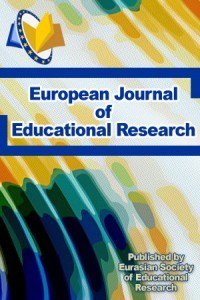Examining the Relationship between Referee Performance and Self-Efficacy
Examining the Relationship between Referee Performance and Self-Efficacy
___
- Bandura, A. (1977). Self-efficacy: Toward a unifying theory of behavioral change. Psychological Review, 84(2), 191-215.
- Bandura, A. (1986). Social foundations of thought and action: A social cognitive theory. Englewood Cliffs, NJ: Prentice-Hall.
- Bandura, A. (1997). Self-efficacy: the exercise of control. New York: Freeman.
- Catteeuw, P., Helsen, W., Gilis, B., & Wagemans, J. (2009). Decision-making skills, role specificity, and deliberate practice in association football refereeing. Journal of Sports Sciences, 27(11), 1125–1136.
- Dosseville, F., Laborde, S., Raab, M., & others. (2011). Contextual and personal motor experience effects in judo referees’ decisions. Sport Psychologist, 25(1), 67-81.
- Ekmekci, R. (2008). Determining the source and coping style of stress among basketball referees and developing preventative administrative practices (Unpublished doctoral dissertation). Abant Izzet Baysal Universty, Bolu, Turkey.
- Ekmekci, R. (2016). Psychological preparation in refereeing. Ankara: Detay Publication.
- Farshad, T., Esmaeili, M. R., & Bavandpour, R. (2013). The effect of self-efficacy on job satisfaction of sport referees. European Journal of Experimental Biology, 3(2), 219-225.
- Feltz, D.L., Short, S.E., & Sullivan, P.J. (2008). Self-efficacy in sport. Champaign, IL: Human Kinetics.
- Fraenkel, J. R., & Wallen, N. E. (2009). How to design and evaluate research in education (7th ed.). New York: McGraw-Hill.
- Guillén, F., & Feltz, D. L. (2011). A conceptual model of referee efficacy. Frontiers in psychology, 2, 1-5.
- Hepler, T. J., & Feltz, D. L. (2012). Take the first heuristic, self-efficacy, and decision-making in sport. Journal of Experimental Psychology: Applied, 18(2), 154.
- Karacam A. & Pulur A. (2016). Identification the Relation between Active Basketball Classification Referees' Empathetic Tendencies and Their Problem Solving Abilities. Universal Journal of Educational Research, 4(8), 1912 – 1917 doi:10.13189/ujer.2016.040822
- Karacam, A., & Pulur, A. (2017a). Adaptation study of referee self-efficacy scale (REFS) to Turkish. Nigde Universty Journal of Physical Education and Sports Sciences, 11(1), 118-128.
- Karacam, A., & Pulur A. (2017b). Examining the relationship between referee self-efficacy and general self-efficacy levels of basketball referees in terms of certain variables. Journal of Education and Training Studies, 5(8), 37-45 doi:10.11114/jets.v5i8.2450.
- Karacam, A., & Pulur A. (2017c). Examining the relationship between referee self-efficacy and general self-efficacy levels of football, basketball and handball referees. Universal Journal of Educational Research, 5(9), 1571-1579. doi: 10.13189/ujer.2017.050914
- Karacam, A , Pulur, A . (2018). The Zest for Work Scale for Referees: Validity and Reliability Study-ZWSR. Gaziantep Universty Journal Of Sports Sciences, 3(2), 35-45. doi: 10.31680/gaunjss.416737
- Myers, N. D., Feltz, D. L., Guillén, F., & Dithurbide, L. (2012). Development of, and initial validity evidence for, the Referee Self-Efficacy Scale: A multistudy report. Journal of sport and Exercise Psychology, 34(6), 737-765.
- Pizzera, A., & Raab, M. (2012). Perceptual judgments of sports officials are influenced by their motor and visual experience. Journal of Applied Sport Psychology, 24(1), 59–72.
- Spencer, B. D. (2015). Self-efficacy and performance in volleyball referees (Unpublished master’s thesis). Michigan State University, Michigan, USA.
- Tuero, C., Tabernero, B., Marquez, S., & Guillen, F. (2002). Análisis de los factores que influyen en la práctica del arbitraje [Analysis of the factors affecting the practice of refereeing]. SCAPE, 1(1), 7–16.
- ISSN: 2165-8714
- Başlangıç: 2012
- Yayıncı: Eurasian Society of Educational Research
Pre-service Teachers’ Opinions about the Use of 21st Century Learner and 21st Century Teacher Skills
Canses TİCAN, Sabahattin DENİZ
Writing for and Because of Lifelong Learning
Esma BULUS KİRİKKAYA, Billur BASARAN
Using Personal and Social Responsibility Model for Gaining Leadership Behavior in Students
The Attitudes of Teachers towards Multicultural Education
Mehmet Fatih KARACABEY, Mustafa OZDERE, Kivanc BOZKUS
Makbule KALİ SOYER, Berke KİRİKKANAT
Investigation of the 5th Grade Students’ Engagements in Mathematics Course towards Student Opinions
Ozge DEVECİ, Cigdem ALDAN KARADEMİR
A Mixed Research on Cheating and Absenteeism Behaviors of Teacher Certificate Program Students
